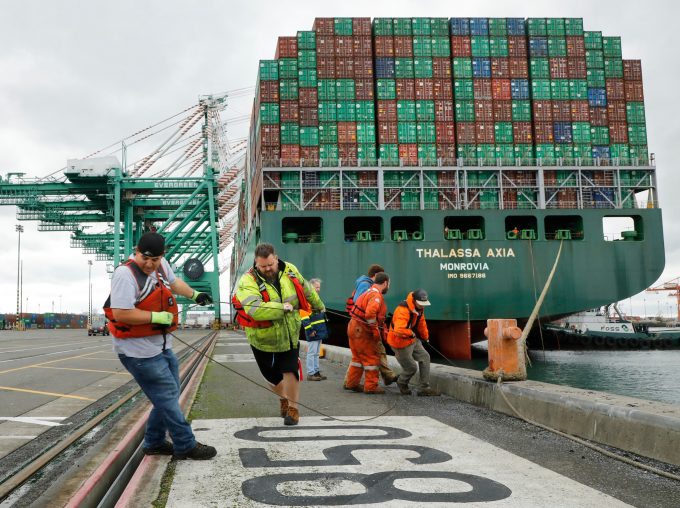
Authorities in the US seem to have woken up to the fact that shipping is a strategic business – some would say it’s not before time – and suggest if you are not a player, you can’t affect the game.
A team of academics and national security advisors from the Northeast Maritime Institute’s Center for Ocean Policy and Economics (COPE) presented a report in mid-December entitled A Revitalisation Plan for US Maritime Trade, Commerce and Strategic Competition that lays out proposals to re-assert US commercial ambitions in the maritime sector, and to compete, to some extent, with China’s Belt and Road initiative.
At the end of January, former US ambassador to the United Nations John Negroponte, along with Albert Bryan, governor of the US Virgin Islands, introduced the first step of the plan with the announcement of an open registry, with its administration based in the islands.
In what turned out to be a policy double-header, the senate also began its debate on reforms to the Ocean Shipping Reform Act 2002, put forward by democrat senator Amy Klobuchar and republican John Thune, legislative tweaks that would bring about a change in the shipper/carrier relationship, or so it is hoped.
But the wide-ranging report on the status of the US maritime sector takes a more ruthless approach to America’s plight, vis-à-vis the shipping sector, laying bare its deficiencies.
According to the report, which was two years in the making: “The US is vulnerable to supply chain volatility, which can be used as a tool for economic warfare by competitors. The US lacks a resilient, technologically enabled maritime supply chain capable of securing and monitoring cargo entering the continental US.”
Furthermore, just 0.12% of global shipbuilding is conducted in the US, while the top nine container lines are organised into three major alliances, controlling 83% of maritime trade, and another 16 companies handle 80% of the world’s container manufacturing and leasing.
“None of these leading container companies are American,” said the report.
Thus, the country’s “heavy dependency on foreign vessel and container manufacturers significantly reduces the US’s organic capabilities, has cost the economy thousands of jobs, and means the US cannot take a leading role in decarbonising these critical industries”.
The solutions to this are a multi-million dollar multi-faceted plan to revive an industry in the country where containerisation was launched. Today, the shipping industry handles $4 trillion of US trade, but less than 2% of that is on US-owned ships.
“The current supply-chain crisis is but the latest manifestation of our near-total dependence on foreign maritime distribution and an American maritime industry in steady decline over the last half century,” highlighted the report, with the warning that: “This is a serious strategic vulnerability for the American homeland. It is time for an honest realisation that our nation must build up its domestic maritime capacities.”
A six-point plan “lays the foundation for the revival of the US commercial maritime sector” and includes the development of a “Flag of Responsibility” in the US Virgin Islands that will offer “transparent oversight” to a commercial fleet composed of foreign and domestically owned and operated vessels.
The registry will be followed by the development of a Caribbean transhipment hub “to increase trade capacity through efficiencies”. Moreover, a training programme within the US and abroad will bring new “talent” as well as increase the skills of the existing workforce.
A National Maritime Sustainability Strategy that includes “Green Maritime Highways” and a “Green Shipping Certification Program for USVI-Flagged Vessels” will benchmark the “sustainable construction, operation, management, and planning of ships and infrastructure”.
Inter-agency collaboration will oversee the developments and enforce “legal and ethical standards”.
Funding for the new strategy will be provided by a maritime venture capital fund to “rapidly build commercially successful solutions that are technologically innovative, economically viable and globally deployable with a goal of solving maritime and ocean industry problems with a focus on ecological sustainability”.
Specific costings for these initiatives were not discussed within the report.
Nevertheless, the extent to which the current administration implements the strategy could have significant implications for the future of US supply chains in particular and, more broadly, for the wider global container shipping industry.
The report suggests that the modernisation process will need to ensure sustainability is at its core, with environmentally friendly technology. In addition, there will be a focus on the digitalisation of processes and working practices, offering a smoother flow of cargo and supply chain security and efficiencies.
Key to the success of the whole project is the funding mechanism which focuses on what the report calls “philanthropic capitalism”, which “blends free-market economics and for-profit structures with value-based pursuits such as social responsibility and environmental sustainability initiatives”.
The plan is to provide for commercial realities within a politically and environmentally sustainable framework, offering change over a short period of time. Moreover, the requirement to develop digital solutions should be led by government so that a collaborative and transparent system can be effectively nurtured.
“At present, many companies are building small-scale solutions, but harbouring data about those solutions in private forums; this increases opaqueness in the sector. There is an opportunity for the US government to front-run these activities by trialling new innovations in a nimble fashion.
“In parallel, open data sharing should be encouraged, to maintain a collaborative environment and to assist with transparency on critical matters like technological impact, emissions reductions, and personnel safety.”
The report says such an approach will build an efficient and environmentally sustainable maritime infrastructure.
Many of those within the maritime sector and who use supply chains into the US will welcome the report. While the US Virgin Islands registry announcement is a start, it can only be successful if the rest of the recommendations are realised.


